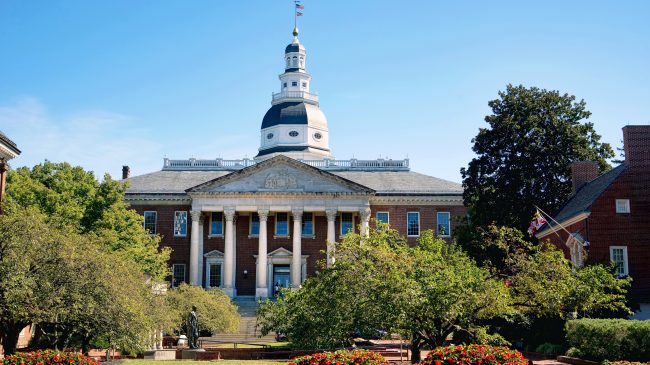The Maryland state legislature is once again considering a ban on all flavored tobacco products, including flavored vaping products and menthol cigarettes.
Fortunately, Maryland has a chance to learn the true costs of such a prohibition because Massachusetts adopted the same policy last year. As the flavored tobacco ban was debated there, opponents warned Massachusetts lawmakers that the ban’s alleged public health benefits wouldn’t materialize, in part, because cross-border tobacco sales in neighboring states would surge as customers sought their favorite products.
Those predictions were correct.
Tobacco sales in nearby states increased dramatically after flavored tobacco products were banned last June. Massachusetts’ cigarette excise tax stamp revenues fell 24 percent from June 2020 until November 2020, according to the New England Convenience Store and Energy Marketers Association. And over the course of those five months after prohibition went into effect, Massachusetts lost $62 million in cigarette tax revenue.
During this same time period, tobacco sales in Rhode Island and New Hampshire rose 18 and 29.7 percent respectively. Rhode Island gained $14 million in cigarette tax revenue and New Hampshire’s increased by $28.5 million. And these figures underestimate Massachusetts’ total economic losses from the flavored tobacco ban because the figures do not include sales or lost taxes from e-cigarettes, smokeless tobacco, or cigars, which Massachusetts residents are also crossing state borders to purchase.
Perhaps Massachusetts’ revenue loss would be worth it if the public health gains were large enough, but if you combine the increased sales of non-flavored cigarette sales in the state with the rising cigarette sales in neighboring Rhode Island and New Hampshire, cigarette sales are actually up overall.
In Maryland, the flavored tobacco ban’s bill sponsor, State Sen. Mary Washington, as well as State Delegate Jazz M. Lewis, a vocal supporter of the ban, seem to be less concerned about these revenue losses as they are the fact that menthol cigarettes are overwhelmingly the choice of black smokers. Around 85 percent of black smokers use a menthol product and banning menthol, they hope, will dramatically reduce black smoking rates.
Earlier this month, in a Maryland Matters op-ed State Senator Washington and Delegate Lewis wrote, “It is our job to protect Marylanders, especially our youth, from these toxic products that cause death and suffering in our communities.”
This is certainly a noble pursuit and the legislator’s intentions are good. But do black Marylanders smoke at higher rates than White smokers, who mostly choose nonmenthol cigarettes?
In 2019, the latest year for which we have complete data, Maryland’s White smoking rate was 14.1 percent while the black smoking rate was actually slightly lower, at 12.6 percent.
As for young people, for whom Maryland’s flavored tobacco prohibition is also claiming to target, Maryland’s youth smoking rates show a similar pattern to its adult rates. According to the Centers for Disease Control and Prevention’s 2019 High School Youth Risk Behavior Survey, black youth are actually two percent less likely to have smoked a cigarette in the last 30 days than their White peers — 3.3 percent and 5.4 percent, respectively. These data confirm Reason Foundation’s 2020 findings that showed states with higher menthol cigarette distribution rates, such as Maryland, tend to have lower, not higher, youth smoking rates.
Though black smokers smoke at lower rates than White smokers, under Maryland’s proposed flavored tobacco ban, menthol, and flavored choices are targeted for prohibition whereas the cigarette products favored by White smokers would remain legal.
What is especially disappointing is that in other similar cases, Delegate Lewis recognizes the criminal and racial justice problems that the prohibition of substances poses. Lewis filed a bill to legalize marijuana in Maryland.
“The prohibition on the responsible use of cannabis has done exponentially more harm than good, and has devastated communities with a heavy-handed and unfair drug policy,” Lewis wrote on Twitter.
And in a Facebook post about his marijuana legalization bill, Lewis said, “The first step in any policy is to do no harm. The data shows that we can enhance public safety through legalization.”
Delegate Lewis is correct and should realize the same problems with marijuana prohibition applies to flavored tobacco prohibitions. When Congress debated this same issue last year, the American Civil Liberties Union and other civil rights groups warned banning flavored tobacco products would disproportionately impact people of color, trigger unnecessary criminal penalties, and prioritize criminalization over public health and harm reduction efforts.
Banning menthol cigarettes will dramatically increase the already substantial illicit tobacco trade in Maryland. Much of this new trade will take place in black communities, which would mean any law enforcement efforts aimed at curbing black-market menthol sales will be disproportionately targeted towards these same communities.
At the same time, those who wish to buy regular cigarettes, which are equally deadly, can continue to do so with no legal ramifications.
When politicians consider adopting a new law, they rarely have the opportunity to examine a controlled experiment showing the results from nearly the exact policy they are proposing being put to the test. Maryland has such a chance. All it needs to do is look at Massachusetts.
There are criminal justice reform reasons, public health justifications, and financial facts that show why Maryland should reject an unfair and ineffective flavored tobacco ban.

